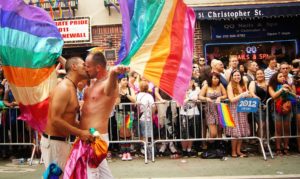“Julie Bindel takes to right wing GB News to smear the trans community with the same trope that was used against gay men in the 1980s — that they are all paedophiles. Has she forgotten that made gays a target for physical violence? Does she care if trans people are now targeted too?”
Billy Bragg didn’t much care for my appearance on Andrew Doyle’s Free Speech Nation.
He got it wrong, though. I had not accused trans people or gay men of anything of the kind. I had simply pointed out that Minor Attracted Persons (MAPs), a sanitised term for paedophiles, were being included by queer activists in the ever-expanding rainbow flag and that it should be a matter of some concern. What I said was: “I don’t, as a lesbian, want to be lumped in with ‘minor attracted persons’, which, of course, is the latest addition to this rainbow coalition and means ‘child abusers’”.
The first use of the euphemism “minor attraction” to describe those who desire sex with children was back in 1988, by a journalist called Elizabeth Peterson in a Christian publication. She was appealing for empathy and understanding towards “paedophiles”. Since when, there has been a creeping attempt in certain quarters to normalise their desires.
In particular, a number of British academics within the Queer Theory discipline have, over the past few years, pushed the idea that “paedophilia and child abuse are not the same thing”, and that “paedophilia is a sexual attraction pattern that shares common features with other sexual orientations”. Bafflingly, child sexual abuse is being described by some clinicians as a sexual identity worthy of empathy. Additionally, attempts have been made to bring it under the rainbow coalition where it should be treated with dignity and respect; Norwegian “queer” academic and professor of ethics Ole Martin Moen argues that paedophilia should be treated as a sexual identity.
Jacob Breslow, feels the same. He was, until his affiliation with organisations promoting paedophilia as a sexual identity came to light, a trustee at Mermaids. When a graduate student at the London School of Economics, Breslow gave a presentation at a 2011 event for the US-based organisation B4U-ACT, co-founded in 2003 by a convicted child sex offender to help people “who are sexually attracted to children and desire assistance”. There, he said that: “Allowing for a form of non-diagnosable minor attraction is exciting, as it potentially creates a sexual or political identity by which activists, scholars and clinicians can begin to better understand Minor Attracted Persons.”
Then, in June 2021, trans-identified queer scholar Allyn Walker published their book A Long, Dark Shadow: Minor-Attracted People and their Pursuit of Dignity, making a clear link between queer theory and child abuse apologism. In it, Walker posits there are many similarities between MAPs and lesbians and gays. Walker’s PhD thesis, titled “Understanding Resilience Strategies among Minor-Attracted Individuals”, argued that such men should be permitted to view child abuse imagery as a “harm-reduction technique” or “form of therapy” to help “maintain abstinence from sexual contact with children”. Following complaints about their book being “pro-paedophilia”, Walker was suspended from their professorial post at Old Dominion, Virginia.
You might remember Karl Andersson, a UK-based student in queer studies at the University of Manchester, who got into trouble last year when an essay based on his experiences of masturbating to Japanese comics of child sexual abuse was published in the academic journal Qualitative Research. When the complaints flooded in, the university had no choice but to suspend Andersson, claiming that because he worked in a “niche area” of studies, no one noticed what he was up to. That “niche” is queer studies.
Andersson also publishes the magazine Destroyer: A Journal of Apollonian Beauty and Dionysian Sexuality, a Swedish-based journal focused on sex and “romance” between men and underage boys. Its stated objective is “to bring back the adolescent boy as one of the ideals of gay culture”. Breslow has praised Destroyer in his own work, claiming it documents the “sexual desire of boys”.
Queer theorists such as Breslow, Walker and Andersson are pushing the line that paedophilia is a hardwired medical condition, and that therefore there must be some kind of “paedophilic gene”. And if these attractions are both innate and uncontrollable, the answer is, according to queer theorists, to feed the beast.
Craig Harper, Associate Professor at the School of Social Sciences at Nottingham Trent University (NTU), also promotes this line of thought. He collaborates with Prostasia — a California-based charity which advocates the use of sex dolls as a way for men wishing to rape small children to vent their sexual frustrations. Prostasia also gives pointers on its website as to “age play” — adults fantasising during sex that one of them is a child.
Harper says MAPs are targeted by unfair online abuse. His study on their use of child sex dolls found that “when asking participants directly about their engagement with criminal activities, we found that there were no differences in self-reported offending between those who owned child-like dolls and those who did not.” The term “self-reporting” is key here. As Caitlin Roper, feminist activists and author of the book Sex Dolls, Robots and Woman Hating points out, arguments used in support of men’s use of child sex abuse dolls, “build on previous arguments by paedophiles and queer theorists in support of men’s sexual access to children”.
A number of organisations, such as Virtuous Paedophiles and B4U-ACT, argue that child abuse imagery and sex dolls are good ways of keeping these men “satisfied”. But Kathleen Richardson, Professor of Ethics and Culture of Robots and Artificial Intelligence (AI) at De Montfort University, is deeply concerned about the way that men’s desire for sex with children is being enabled and encouraged. “For adults to identify with practices that involve the abuse of children implies these are not lone individuals,” says Richardson, “but groups to discuss these issues and are working with academics who use ethics to do their politics of persuasion by arguing they present no harm to children. In fact, it is impossible to have a ‘sexual identity’, without consideration of what it entails.
There are, according to Gail Dines, author of Pornland, studies of use of Internet pornography which have drawn attention to the extent of adult sexual interest in children. “Clinical experience and now research evidence are accumulating to suggest that the Internet is not simply drawing attention to those with existing paedophilic interests but is contributing to the crystallisation of those interests in people with no explicit prior sexual interest in children,” says Dines.
Prior to the internet, groups of men that seeking to decriminalise child sexual abuse met as special interest groups. In 1974, a group of “paedophile rights” activists in the UK formed the Paedophile Information Exchange (PIE) and somehow managed to be welcomed into the upper echelons of polite, liberal society.
PIE, which openly argued for the abolition of the age of consent, convinced the National Council of Civil Liberties (NCCL) to accept them by claiming to be an oppressed sexual minority similar to the gay community. When I interviewed PIE leader Tom O’Carroll in 2015, he told me he had never liked the word paedophile, and that one of the main positives of being accepted by the NCCL, and, as a result, by some gay groups, was that it would mean that men like him could unify and “organise against oppression”. “We were kind of stuck with the word,” O’Carroll told me. “If we had another word, more like gay, it would be hard to stigmatise us.”
O’Carroll suggested that, rather than “paedophile” the word “kindly”, should be used, because it was similar to the Dutch word “kinder”, meaning “children”. “Being ‘kind’ as well as being sexual,” he said.
Alarmingly, these men were not only being painted as harmless, partly by their association with NCCL, but also potentially beneficial to society. In his study of PIE, published in 1983, the psychologist Glenn Wilson made the extraordinary claim that “many members admitted sexual feelings for children which they had been able to contain or turn to social good. Some gravitated toward occupations such as schoolteacher or social worker, where they could enjoy the company of children without plotting abuse”.
But the bad old days of PIE appear to have taught us nothing. PIE was disbanded in 1984, up until 1983 it lobbied for the age of consent to be abolished, appearing on Newsnight to argue its case.
Their influence is being felt still within the echelons of academia and now echoed in the thoughtless slurs of musicians. Those of us who campaign to end the sexual abuse of children do not point the finger at gay men as likely perpetrators, despite Billy Bragg accusing me of doing so. I lived through the Eighties when it was a regular occurrence for lesbians to lose custody of their children, usually to violent ex-husbands, because we were considered to be sexual perverts and dangerous for children to be around.
It is clearly an abhorrence to suggest that gay men, by virtue of being same sex attracted, are a danger to boys. But our defence of gay men from prejudice and bigotry must not act as a smokescreen for those groups that are seeking to normalise sex with children. And this is why including so-called MAPs as part of the rainbow flag would be a disaster.
We should have learned by now that sexual predators of children are not just another oppressed sexual minority in need of support and understanding. Their apologists should not be corrupting our universities with a dangerous ideology. The sexual abuse of children is stigmatised for a reason, and so it should remain.
Disclaimer
Some of the posts we share are controversial and we do not necessarily agree with them in the whole extend. Sometimes we agree with the content or part of it but we do not agree with the narration or language. Nevertheless we find them somehow interesting, valuable and/or informative or we share them, because we strongly believe in freedom of speech, free press and journalism. We strongly encourage you to have a critical approach to all the content, do your own research and analysis to build your own opinion.
We would be glad to have your feedback.
Source: UnHerd Read the original article here: https://unherd.com/



